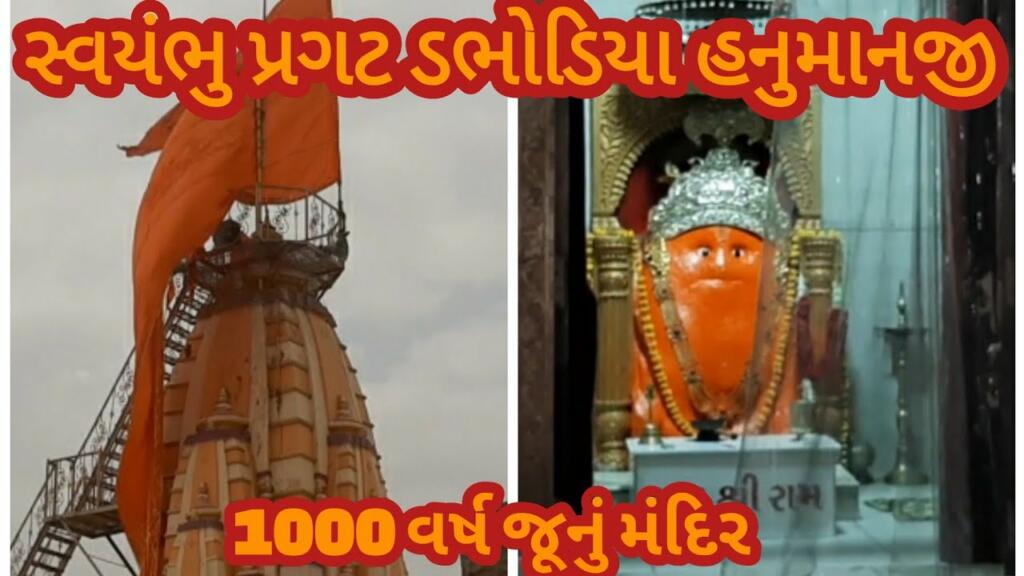Dabhoda Hanuman Mandir Gandhinagar – Guide
Dabhoda, a small village about 15 km from Gandhinagar is very popular for the ancient and historical Hanuman Ji Mandir, also known as Dabhodiya Hanumanji Temple. A big fair is held on Kali Chaudas when around 4000 people come for the consecration of Lord Hanumanji. Kg oil is used. All Saturdays of Chaitra month and full moon – Hanuman Jayanti is the best day to visit this holy temple near Gandhinagar. Sukhdi’s prasad is very popular here and devotees can even take it home.
History of this Temple
Dabhoda Hanuman Mandir Gandhinagar was built during the Mughal rule and there are many interesting stories associated with this holy place. It is also said that this is 1000 years old temple where self-manifested – self-manifested idol of Lord Hanumanji appears. Another legend associated with this place is that when the Mughal king Alauddin Khilji invaded the kingdom of Patan, the king of Patan was hiding in the forest near Dabhoda.
The cowherds went to this forest to graze their cow and found that a cow named Tildi was consecrating her milk at a specific place. Once the king came to know about this, he ordered the digging of this place and during this he found the idol of Lord Hanumanji. Thus the ancient Hanumanji temple built and renovated twice stands as a major attraction in the surrounding area.
Dabhoda Hanuman Mandir Gandhinagar Timings
Dabhoda Hanuman Mandir Gandhinagar opens at 7:00 AM in the morning and close at 7:30 PM in the evening.
| Saturday | 07:00 AM to 07:30 PM, Aarti: 07:30 AM & 06:30 PM |
| Sunday | 07:00 AM to 07:30 PM, Aarti: 07:30 AM & 06:30 PM |
| Monday | 07:00 AM to 07:30 PM, Aarti: 07:30 AM & 06:30 PM |
| Tuesday | 07:00 AM to 07:30 PM, Aarti: 07:30 AM & 06:30 PM |
| Wednesday | 07:00 AM to 07:30 PM, Aarti: 07:30 AM & 06:30 PM |
| Thursday | 07:00 AM to 07:30 PM, Aarti: 07:30 AM & 06:30 PM |
| Friday | 07:00 AM to 07:30 PM, Aarti: 07:30 AM & 06:30 PM |
Place to visit near this Temple
Akshardham Temple
Akshardham Temple is one of the largest temples in the country Gandhinagar, a popular pilgrimage site. The same organization that built the Swaminarayan Temple in Delhi, BAPS Swaminarayan Sanstha, built this temple dedicated to Lord Swaminarayan.
Adalaj Stepwell
The exquisite Adalaj stepwell was skillfully constructed to overcome the scarcity of water in and around Adalaj village. Bawdi is about three to four kilometers southwest of Gandhinagar, the capital of the state of Gujarat. One of the many step wells built in India to allow access to groundwater is the Adalaj Stepwell, which was constructed in 1498.
Puneet Van
There is a botanical garden named Puneet Van in Gandhinagar, the capital of the Indian state of Gujarat. With the assistance of the timber branch of the Gujarat government, it was upgraded in 2005. The forest area department has created several acres of land where trees were planted that symbolized the constellations, planets and signs of the zodiac.
Trimandir
Trimandir in Gandhinagar, more than 40,000 square feet in size, combines Jainism, Shaivism and Vaishnavism under one roof. A beautiful green garden, old wooden chairs and a stunning tall fountain surround the entire temple.
Also Read: Neelam Mata Mandir Mayur Vihar, Timings, Travel Guide and How to reach
How to reach Dabhoda Hanuman Mandir Gandhinagar
By Air- The nearest airport from Dabhoda Hanuman Mandir is Gandhinagar airport which is at a distance of about few kms from this temple. From here you can easily reach this temple by using local transport services or taxi.
By Train- The nearest railway station from Dabhoda Hanuman Mandir is Gandhinagar railway station which is at a distance of about few kms from this temple. From here you can easily reach this temple by using local transport services or taxi.
By Road- Roads to this temple are well connected with the other cities of the country so you can easily reach this temple by using your own vehicle or by any public buses or taxi from any part of the country.
Subscribe our TFI Dharma YouTube channel to watch Devotional videos because we are here to serve Sanatana Dhrama: TFIDHARMA
